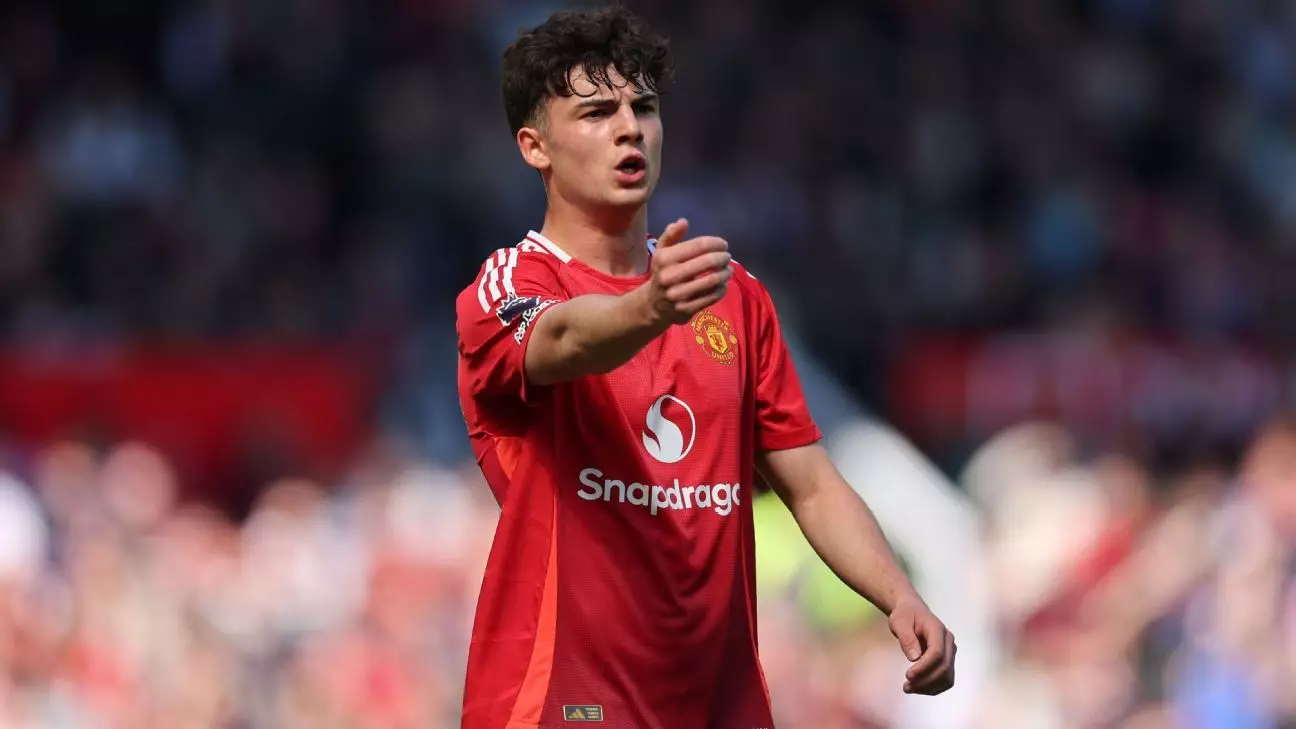In a footballing landscape often dictated by tradition and expectations, Manchester United’s current predicament has turned the club’s priorities upside down. With the Premier League season spiraling into an unproductive phase, fans and critics alike can’t help but notice that the Europa League has transformed into the main focus for the Red Devils. As the echoes of a disheartening 1-0 defeat to Wolves reverberated through Old Trafford, one could sense a silver lining amidst the shadows of disappointment—opportunities for young talent to shed their rookie status and step into the limelight.
Ruben Amorim, at the helm of Manchester United, faced scrutiny after yet another lackluster league performance, but he didn’t let the weight of expectations crush his spirit. Instead, he took a bold step by integrating promising youth players into the senior squad, offering them a chance to flourish in a high-stakes environment. As a mentor, Amorim demonstrated that even in defeat, there exists a pathway to resilience and growth.
Emerging Talent: The Bright Future Ahead
The most heartening aspect of this transition has been the emergence of young players like Tyler Fredricson. At just 20 years old, Fredricson made his first senior appearance, stepping onto the pitch with a poise that belied his inexperience. Positioned in a back three, he demonstrated not only tactical awareness but also the physicality needed to hold his own against seasoned opponents. From an impressive defensive maneuver to initiating forward plays, Fredricson showcased the potential that had been stifled by injuries in his earlier career.
Watching him on the pitch, one could not help but feel that Fredricson could become a cornerstone of the team’s defensive lineup in future seasons. With Amorim utilizing the opportunity to field fresh talent, it’s clear that Fredricson’s successful debut might be the beginning of a revitalizing trend for the underutilized youth academy.
Equally impressive was 18-year-old Harry Amass, who joined Fredricson in not merely fulfilling a role but insisting on being part of the narrative. The sooner Amorim realizes that incorporating these youngsters isn’t just a stopgap during injuries, but rather a strategic advantage, the richer the team’s future will be.
The Goal-Scoring Conundrum
However, bringing fresh talent onto the field won’t suffice if the existing squad can’t find the back of the net. The reality is stark: Manchester United’s struggles extend far beyond youthful exuberance. Rasmus Højlund, who has become emblematic of the team’s struggles, has found himself mired in a goal drought that has eclipsed thirty hours of competitive football. The pressure on strikers to deliver can be overwhelming, yet Højlund’s woes seem to encapsulate a broader malaise that hunts the entire squad.
Amorim noted that the issue extends beyond individual performance; it’s a collective challenge. The crux of the problem is not grounded simply in missed opportunities but instead reveals a more systemic failure to adapt and capitalize on goal-scoring chances. United must cultivate an environment conducive to creativity and ask probing questions about how they approach offensive play. Strikers need service from the midfield, patience in build-up play, and a sense of confidence in their roles.
From Shadows to Light: The Path Forward
While the defeat against Wolves could easily cast a pall over the team’s ambitions, it’s essential to recognize the positive signs emerging from a difficult season. With young talents getting their long-overdue chances, Amorim may be steering the club away from languishing in the depths of mediocrity. The trajectory resembles a phoenix rising from the ashes rather than an institution stranded in sameness.
Moreover, the looming threat of relegation provides both a challenge and an impetus for transformation. Top clubs rarely find themselves in such precarious positions, but there is potent motivation to rise above. United now faces the task of rekindling their competitive spirit while birthing a new era marked by accountability and rejuvenation. The club’s journey isn’t just about surviving another season; it’s about heralding hope for a bright future built on emerging talents.
As the closing stages of the season draw near, the Europa League looms as a final opportunity for Manchester United to salvage some pride. Whether Amorim can synchronize the blend of youth and experience into a coherent unit capable of challenging for silverware remains to be seen. Yet, amidst the challenges, one thing is abundantly clear—the spirit of resilience is thriving, and Manchester United may well be on the precipice of a new dawn.

